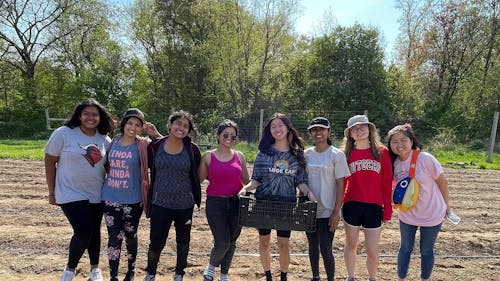Targum spotlight: One Health promotes interconnectivity of living species

The Rutgers One Health Club, an on-campus organization, uses community events to draw attention to the global One Health Initiative.
One Health is an emerging concept in academia and science that aims to better understand and acknowledge the connection between all of Earth's organisms.
Likhitha Patlolla, a School of Environmental and Biological Sciences senior and vice president of the Rutgers One Health Club, said the organization was created to increase awareness of the ideology surrounding One Health, which was previously only taught in academic settings such as University public health classes.
The founders of the club were inspired by the work of Gloria Bachmann, director of the Women's Health Institute and dean of Rutgers Robert Wood Johnson Medical School (RWJMS), who introduced the teachings of One Health at Rutgers.
"We thought an undergraduate club would be a great way to raise awareness about (One Health), educate a lot of undergraduate students on it because it's going to be an important application in a lot of career fields and also help promote the movement at a lower level," Patlolla said.
Amy Li, a School of Arts and Sciences senior and president of the Rutgers One Health Club, said the club recently broadened to cover human and environmental health after initially only focusing on animal health.
The club consists of approximately 20 members this semester, with membership open to interested undergraduate students of any major, Li said.
"One Health is a very transdisciplinary concept, so people of all different majors can participate in the club and take something from it," she said.
During weekly meetings, the organization's executive board provides guidance to its different committees, including those for programming, outreach and communications and journaling, Li said.
The outreach and communications committee creates content for social media pages, the programming committee contributes to event planning and the journal club creates biweekly presentations about various topics pertaining to public health, Patlolla said.
In addition to initiatives like creating its own blog, the club hosts events throughout the year to further spread its message. In the past, members have talked about agriculture and climate change to children at the East Brunswick Public Library, planted produce at the Rutgers Gardens Student Farm and moderated panels that featured distinguished figures from the One Health movement, Patlolla said.
"The topics of One Health that we're discussing, they're all really important to learn about, and we don't think that there's really an age that's too young to start learning," she said.
Patlolla said her favorite memory of an event was teaching children about agriculture and conducting an activity where they painted a pot, planted seeds inside it and took their creations home.
"Seeing the excitement in these kids, even though they're very little and they probably don't grasp 100 percent of everything One Health so far, it's just the fact that they're able to associate it with something so fun (that) was really great to see," she said.
Heather Butler, a School of Environmental and Biological Sciences junior and social media coordinator for the Rutgers One Health Club, said club members also had the opportunity to participate in the Mid-Atlantic Regional One Health Consortium at Rutgers in August 2022.
Speakers from Delaware, Pennsylvania, New York and New Jersey met at the New Jersey Institute for Food, Nutrition and Health building on Cook campus to share information on topics such as climate change.
Sarah Levin, a School of Arts and Sciences sophomore and program coordinator for the club, said for the future, the club hopes to begin volunteering at Ronald McDonald House Charities, collaborating with other on-campus organizations and continuing events to educate the public.
She said that because One Health welcomes members of all backgrounds and discusses various topics through its journaling committee, the club is able to facilitate meaningful conversations.
"Everyone who's part of this club has a voice in this club," Levin said. "Just as a club member, you can make things happen, you can have an opinion, you can present journal presentations, be a leader, work on your public speaking skills and most importantly, learn about all of these topics and how they're important to your daily life."



